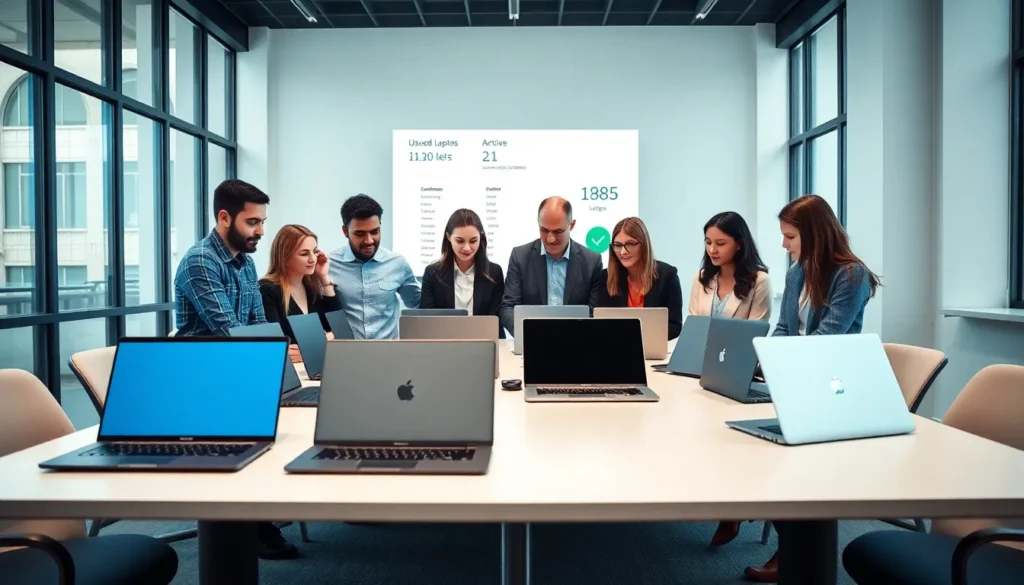Table of Contents
ToggleLooking for a laptop that won’t expensive? Cheap used laptops might just be your golden ticket. Not only can they save you a mountain of cash, but they also come with a few surprising perks. Picture this: a fully functional laptop for a fraction of the price of a new one. Who wouldn’t want to score a great deal while also being a friend to Mother Earth? In this text, we’ll explore the ins and outs of buying used laptops with all the wit and wisdom you need to make a confident purchase. Let’s jump into this savvy shopping adventure.
Understanding the Benefits of Buying Used Laptops

Cost Savings Compared to New Laptops
Choosing a used laptop can lead to substantial savings. Imagine spending only half, or even less, of what you would on a brand-new model. That means extra cash in your pocket, maybe enough for a nice dinner or that brand-new video game you’ve been eyeing. Not only do you get good functionality, but you essentially bypass that annoying hit of brand depreciation that comes with new electronics. Many models lose value quickly once they leave the shelf, making used laptops a better financial choice for many buyers.
Environmental Impact and Sustainability
Aside from saving bucks, buying used laptops gives a splendid nod to sustainability. Every reused device means one less gadget in a landfill waiting to become e-waste. It’s a win-win scenario, contributing positively to the environment while enjoying powerful technology. Keeping this cycle going not only reduces pollution but also promotes a culture of reuse, which is essential in today’s throwaway society.
Common Features to Look for in Used Laptops
Assessing Performance: Key Specifications to Consider
One of the first things to consider when scouting for used laptops is performance. Look for processors such as Intel i5 or AMD Ryzen 5, which provide a balance between efficiency and power. RAM should ideally be at least 8GB for multitasking. Don’t skimp on storage either: solid-state drives (SSDs) are faster and more reliable than traditional hard drives. Checking these specs helps ensure that the laptop meets daily tasks, whether it’s for work, school, or entertainment.
Battery Life and Upgrade Options
Battery life is another key aspect. Look for laptops with good residual battery performance: ideally, they should last at least four to six hours. If the laptop’s battery seems weak, consider if it’s easily replaceable. Models that allow for upgrades, like additional RAM or larger storage, provide more longevity and adaptability, ensuring that your investment lasts longer as your usage needs evolve.
Where to Buy Cheap Used Laptops
Reputable Online Marketplaces
Online platforms like eBay, Amazon, and Craigslist can be treasure troves for finding cheap used laptops. With user reviews and ratings, shoppers can gauge the credibility of the sellers and the quality of their products. Before making a purchase, it’s wise to compare prices across different platforms. Keep an eye out for return policies and warranties too, these features add a layer of security in this sometimes unpredictable market.
Local Options: Refurbished Stores and Auctions
Local refurbished electronics stores often provide an excellent selection. They typically sell laptops that have been tested, cleaned, and certified. You can feel secure knowing that professionals have inspected the devices. Also, local auctions often feature used laptops at surprisingly low prices. Buyers can sometimes nab a fantastic deal if they are patient and willing to do a little research.
Tips for Inspecting and Testing Used Laptops
Physical Inspection and Functionality Checks
When a used laptop catches your eye, the first step is a thorough physical inspection. Look for any signs of wear and tear, such as scratches or dents. Ensure that all ports, keys, and the screen function properly. Testing the keyboard and trackpad is essential: they should respond smoothly without any sticking keys or freezing. It also helps to check the laptop’s fan for noise levels: it should run quietly without unusual sounds.
Software and Warranty Considerations
After ensuring that the hardware is in good shape, turn your attention to the software. Verify that the operating system is up to date and runs smoothly. Ask about pre-installed applications and licenses, especially if it includes any valuable software like Microsoft Office. Checking warranty options or return policies is also crucial. A decent warranty provides peace of mind: it means that if any issues arise, you can address them without shelling out more cash.





